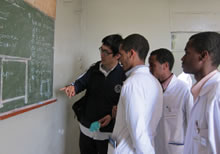
Former resident James Lee, now an Emory cardiac imaging fellow, explained to Ethiopian medical students how to take a patient history and develop a diagnostic plan.
For the past five years, the Department of Medicine has funded rotations in Ethiopia for six third-year internal medicine residents. Now new funding has allowed the medical school to expand the rotation to residents in surgery, radiology, pediatrics, dermatology, anesthesiology, pathology, gynecology and obstetrics, family and preventive medicine, and rehabilitation medicine. Surgical residents will train at Soddo Christian Hospital in Soddo, a city about 248 miles south of Addis Ababa. Everyone else will train at Black Lion Hospital, affiliated with Addis Ababa University (AAU).
James Lee, a former third-year resident who started a cardiac imaging fellowship in August, spent the month of March in Addis Ababa. "It was a unique opportunity to see a medical system that's different from what we have here," he says. "While we had some preparation for what we might see, it was very different from what I expected." He notes that patient care there emphasized the physical exam more than lab work and films.
"About 50% of the cardiac patients I saw were young — in their 20s and 30s — and dying of heart failure due to untreated rheumatic heart disease they had as children," he says. "Although the facilities there are modernizing, resources are limited, and very few people are able to receive prosthetic valves or heart catheterizations. We had to do what we could with the medications that were available. We saw many cases that could have had positive outcomes if we had seen them here in the United States." Lee says that the experience was frustrating at times but extremely rewarding. A highlight for him was teaching third-year AAU medical students how to take a patient history, perform a physical exam, and develop a diagnostic plan.
Former third-year resident Lindsay Margoles, who started an infectious disease fellowship at Emory in July, also traveled to Ethiopia in March. "I found that many of the tetanus patients there were in the ICU and had been intubated a long time, something that you wouldn't see here in the United States. I also started gathering data for my own study on tuberculosis. During our last week, we provided bedside teaching and led differential diagnosis mini-conferences."
Surgical residents will be met in Ethiopia by Jonathan Pollock, who joined the Emory faculty in July 2010 after completing his general surgery residency at Emory. He moved to Ethiopia in July 2011 to serve as Soddo Hospital's assistant program director for its general surgery residency program through the hospital's affiliation with the Pan African Academy of Christian Surgeons (PAACS). Pollock retains his Emory faculty status.
The chosen residents will be working with African doctors, whom PAACS is training to become general surgeons. In return for their training, the doctors must agree to practice in their home country for five years. Ethiopia has one doctor for every 35,000 people.
